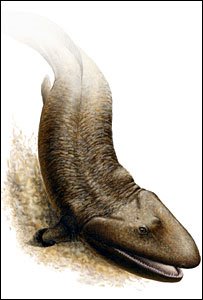Good science, bad decisions
 I have nothing about writing today, but work proceeds on the new "Sheep's End". I also have some of Alex and Lisa's work to mull over.
I have nothing about writing today, but work proceeds on the new "Sheep's End". I also have some of Alex and Lisa's work to mull over.As a one-time future scientist, current journalist, and really just a guy who thinks he knows best, I was drawn to two science stories this week. Let's start with the good science.
What makes evolutionary biology a science? It's what makes anything a science: predictive power. Physics predicts a ball caught in the Earth's gravitational field will drop toward the Earth's center of mass. Chemistry predicts that under specific conditions of temperature and pressure, water at its triple point will exist as three states of matter.
Evolutionary science is harder to understand, because much of its predictive power can only apply in thought experiments based on the conclusions already in hand. Once in a while, however, nature provides a field test - for example, the last 100 years worth of discovery of whale ancestry, completely unknown when Charles Darwin postulated the origin of species.
A recent paleontological discovery qualifies as a brilliant piece of science, not only for the actual fossil, but for how it was discovered.
Paleontologists knew fish with robust fins existed in sediments dated to 385 million years ago (MYA). They also know of creatures with unquestionably terrestrial limbs dated to 365 MYA. What they didn't have was a fossil from that 20-million-year gap that displayed a "hand" form between the two morphologies.
Enter science. Edward Daeschler and Neil Shubin knew that Ellesmere Island had outcrops that geologists date to 375 MYA in age. They also knew that geological science puts this region in the tropics of the time. The formations on Ellesmere had not yet been explored for fossils.
Daeschler and Shubin decided to look in the formation for fossils of that age. If the geology that dated the rocks and predicted a warm climate held true, then, they predicted, they would find fossils of the proper age and morphology to help bridge that 20-million-year gap. If their scientific analysis of the rock or evolutionary theory itself were wrong, well, they'd find a horse or a person or a pterodactyl in the formation they went to study.
As Nature and the BBC report, they found what they were looking for. Welcome to our world, Tiktaalik roseae.
Now, the bad decisions.... CNN reported Monday on an outbreak of mumps in Iowa. Mumps, you ask? Aren't children vaccinated against mumps?
They should be. The vaccine for mumps is part of the standard MMR shots each child should receive. Should receive. Parents are free to refuse or omit vaccinations. Of the 245 Iowans to contract mumps in the recent outbreak, 66% (168) had taken the two MMR vaccinations required for immunization. Another 14% (34) had received only one MMR vaccine (insufficient for immunization) and 20% (43) had not been vaccinated at all. Iowa normally reports five cases of mumps per year.
If Iowa is an average state, MMR vaccination rate hovers around 91%. Let's call Iowa's population 2.9 million. Of the 91% of that 2.9 million who had proper MMR shots, 168 got the disease, for an infection rate of 0.00637%. The unvaccinated 9% caught the disease at a rate of 0.0295%.
Those are both small numbers, but keep in mind that the Iowa mumps outbreak was confined to a small subset of the population. The rate of infection for the improperly or not-at-all vaccinated is 4.6 times higher than it is for the properly vaccinated.
There's no cure for mumps once you catch it, and if you do, you stand a chance of becoming infertile or losing your hearing.
If you're concerned about thiomerosal and its mercury, be aware that the only vaccine that still contains thiomerosal is the influenza vaccine.
Get your kids vaccinated, OK?




1 Comments:
You're forgetting those whose concerns lie in the base of the vaccine - I have two friends back home who are allergic to eggs, which means they cannot have albumin, which is included in the base of many vaccines.
My family has never been advocates of the vaccination in general, especially the flu vax, which in my opinion is completely ridiculous. A vaccination against something that mutates as quickly as Influenza?
As for evolution, predictive power might not be science specific, but rather scientist specific - in that Darwin was able to extrapolate assumptions based on collective evidence...although in this case, you're right. Nature has provided a proper field test.
Nothing more to say right now, but I'm sure I'll have something soon, don't you worry.
Post a Comment
<< Home